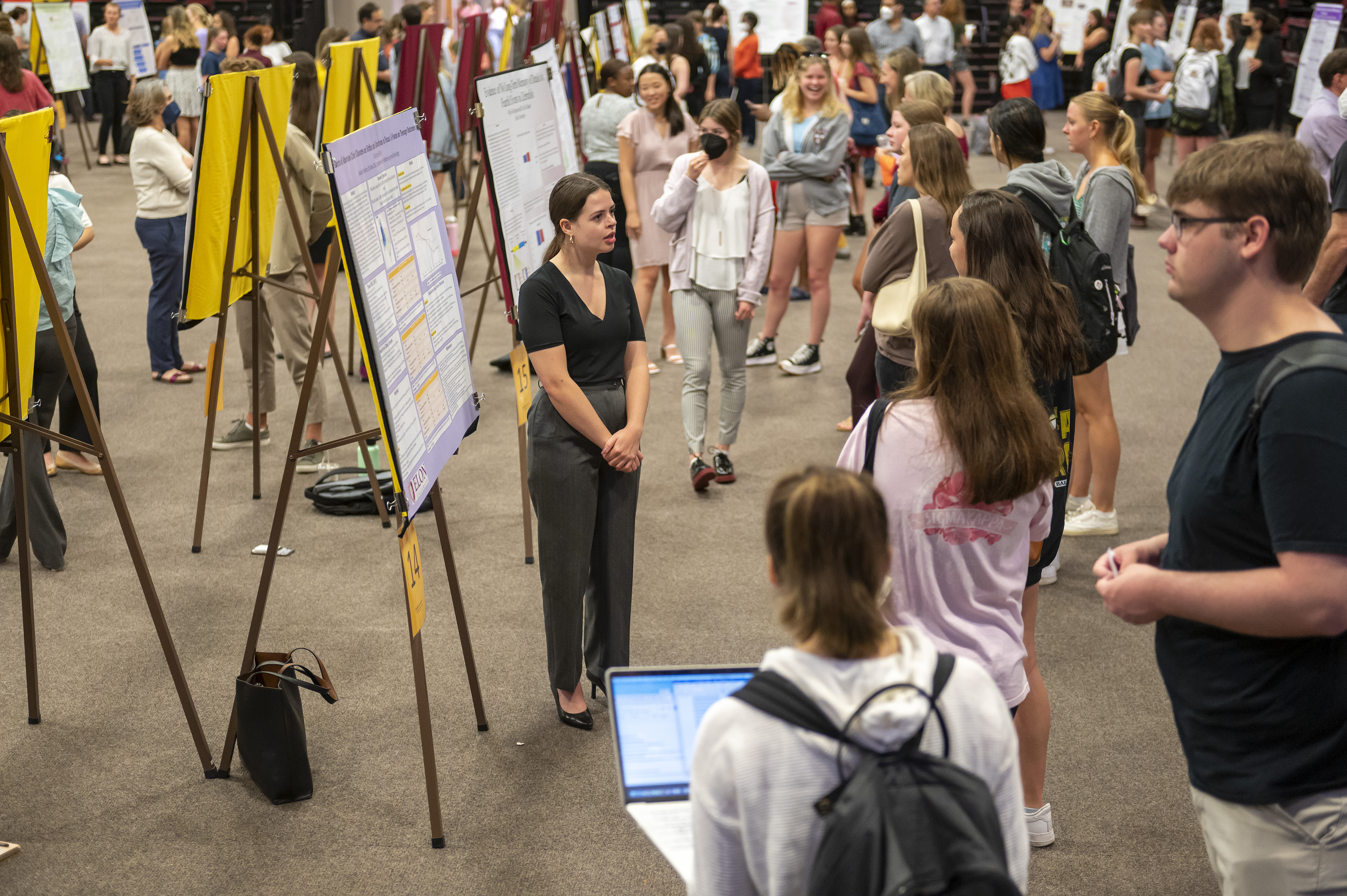With a return to in-person gathering for the first time since 2019, the Spring Undergraduate Research Forum highlighted more than 230 unique and innovative student research projects.
Elon’s 29th annual Spring Undergraduate Research Forum on Tuesday, April 26, saw 220 students display research that has occupied hundreds of hours of their time. SURF is the culmination of the extensive and passionate pursuit of research questions by students from academic disciplines and departments across campus, and this year marked a return to an in-person gathering for the first time since 2019. Students presented research on more than 230 projects, with some students presenting on multiple projects.
“It’s a celebration of research,” said Meredith Allison, director of Elon’s Undergraduate Research Program. “Sometimes, these kinds of events can be more competition-based and we don’t have that element on purpose because this is a chance to celebrate all the work that students have done.”
Nsikak Udoh ’22, a student coordinator with CREDE and one of the 48 diversity, equity, inclusion and access (DEI&A)-based projects at SURF, examined best practices to integrate DEI&A into exercise science and biomechanics. With his faculty mentor, Associate Professor of Exercise Science Matthew Wittstein, along with a group of faculty and student partners, Udoh is working to implement more equitable and inclusive practices in Neuromotor Control and Biomechanics.
A SWOT (strengths, weaknesses, opportunities and threats) analysis was conducted on Elon exercise science faculty to establish a starting point and set goals for growth. During his poster session, participants were able to complete a SWOT analysis to critically examine DEI in their respective areas of work.
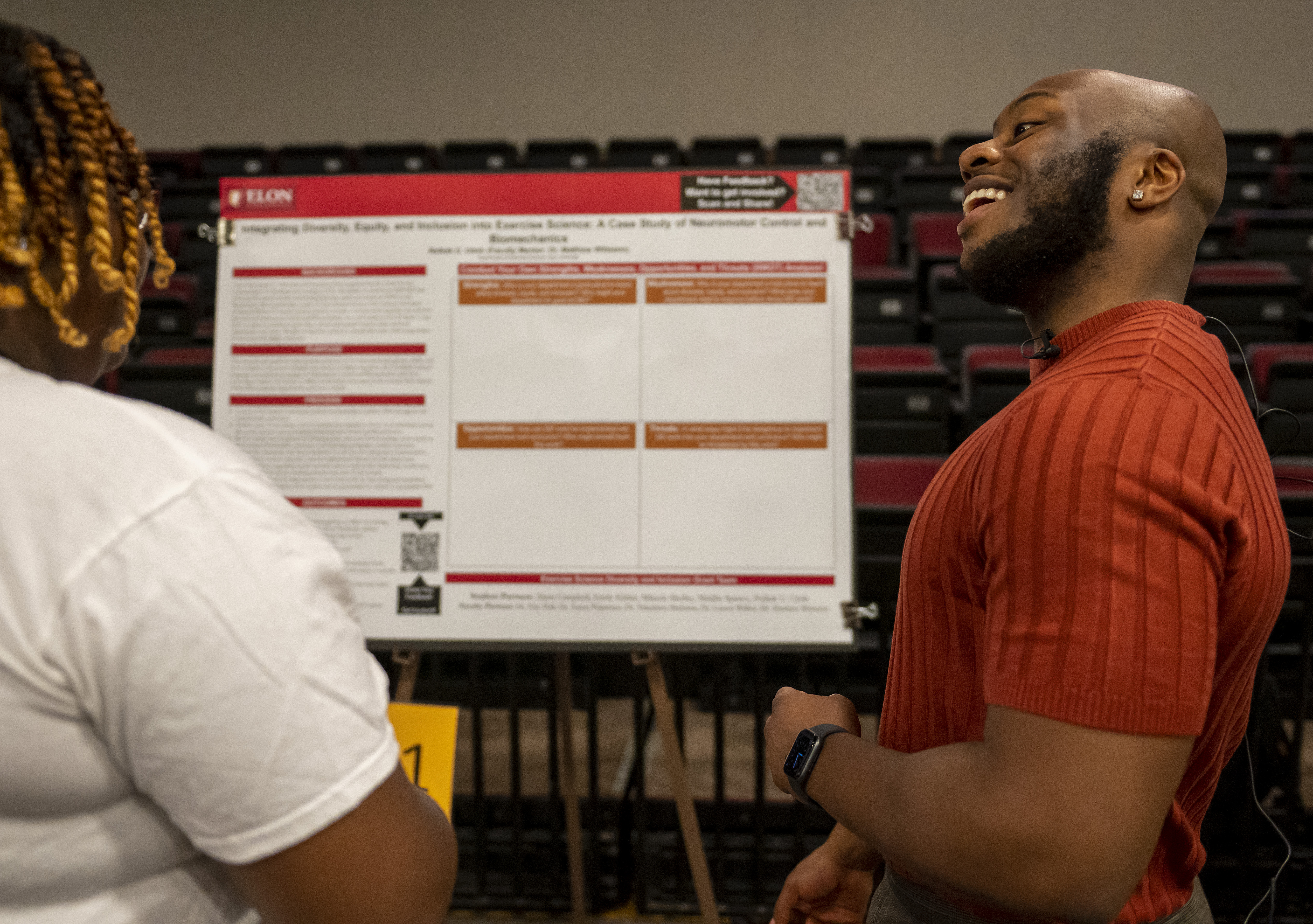
After a year of research, the target is to expand these efforts across other university departments. Students in any discipline are more successful when the environment created for them is inspired by inclusivity.
“We want to be able to create an inclusive environment for everybody because that ultimately stimulates learning,” Udoh said. “When people feel included, they feel respected.”
From dozens of posters displayed throughout Alumni Gym and eager members of the Elon community ready to ask questions about that research to the nearly 100 oral presentations scattered at various locations on campus, SURF returned larger than ever.
“This year, we had more dispersed locations for oral presentations, and you see people going from place to place and spending more time speaking with the student researchers,” said Qian Xu, associate director of the Undergraduate Research Program.
Chloe Yoon ’22, a secondary education and teaching major, focused her research on educator identity development in online spaces. Educators are constantly required to evolve in their teaching and what they offer but are rarely given the time and resources needed to progress.
What tends to happen is educators engage in professional development through online spaces, mostly social media platforms. With her mentor, Associate Professor of Education Jeff Carpenter, Yoon observed those spaces and what their purpose is, how people have been dividing their identities and what they are used for. One aspect she discovered was teachers decide to take that step toward looking for an online community when they are facing challenges in their community.
“If a teacher feels comfortable with how they’re teaching, they don’t seek out this professional development. But, for example, in the Middle East with minority Arab teachers, they don’t feel like they have a community, so they’re going to look elsewhere for it,” Yoon said.
This kind of virtual connection is not exclusively prevalent across the globe. Regularly, the School of Education speaks with local educators about how various issues they are facing at their institutions, and Yoon has seen first-hand the collaboration and growth that comes from these online gatherings.
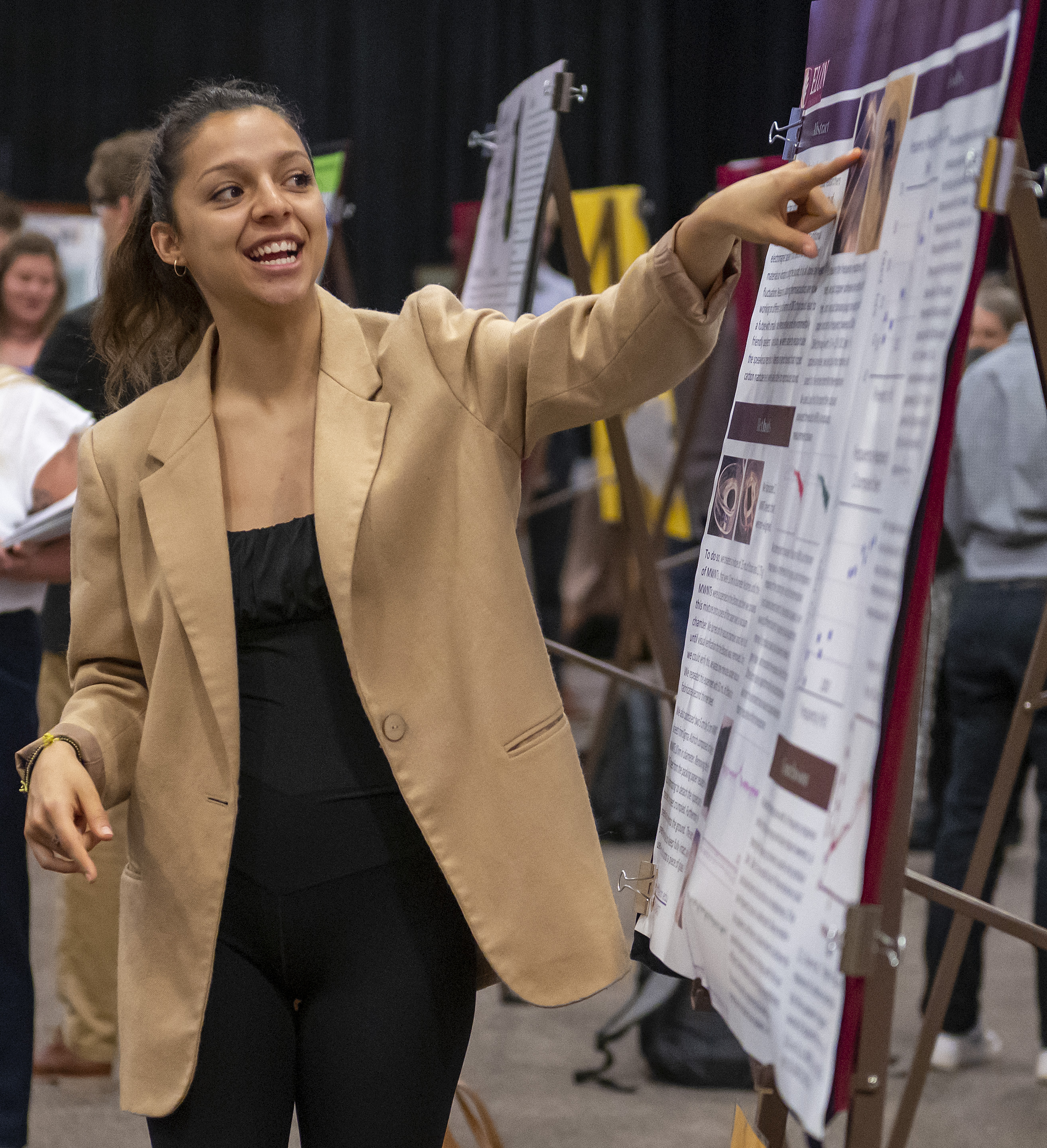
“All of sudden, you’ll have all these teachers and educators and students responding. You get such great ideas all in one place,” she said.
For the two years spent with this research, the most rewarding aspect of the project has been seeing how each continent has its issues specific to that geographic region, but how despite that, they have found community in online areas.
“As a person considering moving abroad to teach, knowing that there might not be a physical community there but an online community to potentially join exclusively is good to know as a teacher,” Yoon said. “As a teacher myself now, I’m scrambling to find all these resources and knowing that there’s a community already there where they’ve shared their resources has been so helpful.”
The genesis of Kimberly Creel’s ’23 research didn’t come from an all-night study session or the idea of a professor. But rather from a long flight with only a Rubik’s cube to occupy her time.
“I was taking a flight to California once and I was like, ‘I want to learn how to actually solve this.’ And ever since then, I’ve been interested in how fast I can solve one,” Creel said.
With the goal of how to solve a Rubik’s cube in as few moves as possible, Creel understood that she couldn’t figure that out using solely mathematical algorithms. So, she is using machine learning methods to solve that question – specifically reinforcement learning, a popular branch of machine learning.
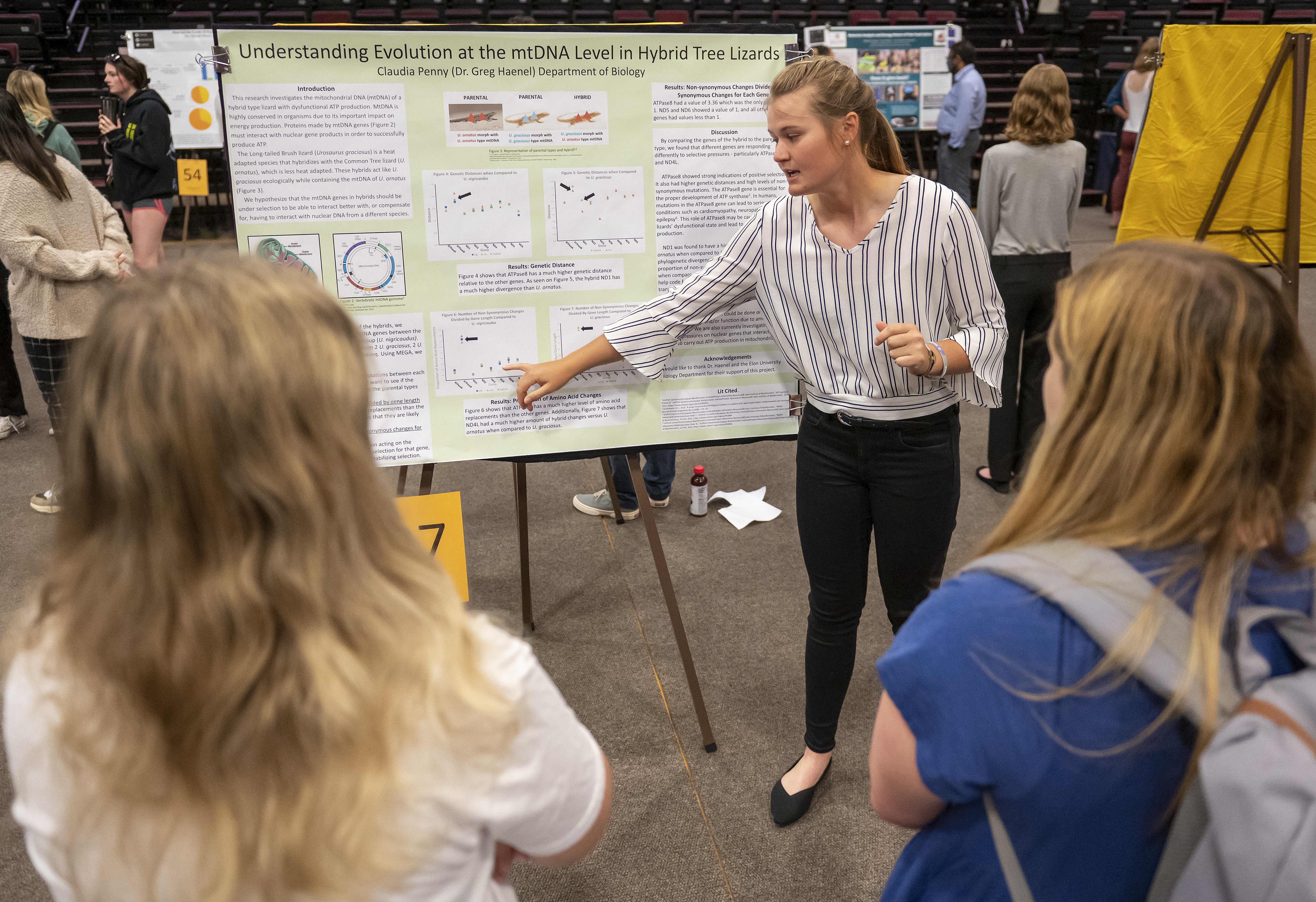
Although the origins of the project were to solve something as inconsequential as a Rubik’s cube, the outcomes can be applied to so many other significant facets of life.
“Machine learning can create functions that we can project how diseases will affect the future, self-driving cars, and other different types of things,” Creel said. “We are trying to project a future based off of what we see in the process of reasoning patterns.”
For many students who pursue undergraduate research, experiences during their first year on campus can impact projects that they will devote months if not years to later during their Elon careers.
Jordan Ennis ’22 points to a paper she wrote for her first class at Elon for opening her eyes to her research that explores “the economics of ethnicity” as demonstrated by the Maasai and Batwa peoples in east Africa. That paper focused on ethnic conflict within the Democratic Republic of Congo, which she said sparked her to learn more about Africa.
“What I learned was really so tragic, and it really motivated me to learn more about this,” Ennis said.
That passion and interest built after she studied abroad in Tanzania, an experience that offered a personal look at how ethnic conflict has disrupted life in east Africa. “I met a lot of people who were directly affected by this phenomenon, and that got me very interested in this and helped immerse me in this,” she said.
Working with her mentor, Assistant Professor of History Waseem Kasim, Ennis examined how colonialism transformed society in east African countries including Tanzania, Kenya and Uganda. That included a shift from subsistence agriculture or pastoral economies into agricultural quotas and the production of crops including coffee, rubber and tea.
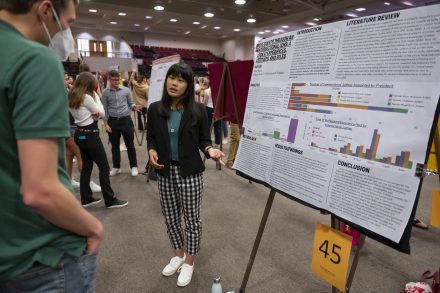
The Maasai people were forced to move from a roaming pastoral lifestyle to being tied down to specific areas of Tanzania and Kenya. That shift created a population boom and also caused overgrazing, two factors that would contribute to a deadly famine.
“It served to solidify ethnicity and the western concept of ethnic groups because of the competition of scarce resources,” Ennis said during her oral on Tuesday. “When you are in that race for survival, you have to fend for yourself and you can’t worry about the other people around you.”
She documented differences in the impact on the Maasai and Batwa people during the colonial period and then after independence in the 1960s. “It’s clear that indigenous groups have been treated horribly throughout history,” Ennis told those gathered for her presentation.
SURF comes this year as Elon is recognized by The Council for Undergraduate Research for its approach to the undergraduate research experience. In March, Elon was one of three institutions recognized with the 2021 Campus-wide Award for Undergraduate Research Accomplishments from CUR.
Elon’s reputation for a robust undergraduate research program can help attract students who want to dive into research to add to their college experience or to lay the groundwork for more intense research as a graduate student.
Sophie Gerth ’22 had set her sights on undergraduate research even before she arrived on campus as a first-year student. On Tuesday morning at SURF, she capped a four-year undergraduate research journey by presenting on her research conducted with mentor Carrie Eaves, an associate professor of political science, in the Lakeside meeting rooms. “This is exactly the reason I came to Elon,” Gerth said.
An Honors Fellow, Gerth was attracted by the opportunity to conduct research while still and undergraduate, an experience she said has helped prepare her for a career in academia. As she considered where to attend college, Elon stood out to her for its ability to provide that experience.
During her oral presentation, Gerth shared about her research examining announcement videos produced by candidates for the U.S. Senate in 2020. Her interest in the topic stems from the highly produced and strategic announcement video featuring U.S. Representative Alexandria Ocasio-Cortez. It’s a video that has since garnered more than 1.5 million views on YouTube alone and helped elevate Ocasio-Cortez’s profile and candidacy.
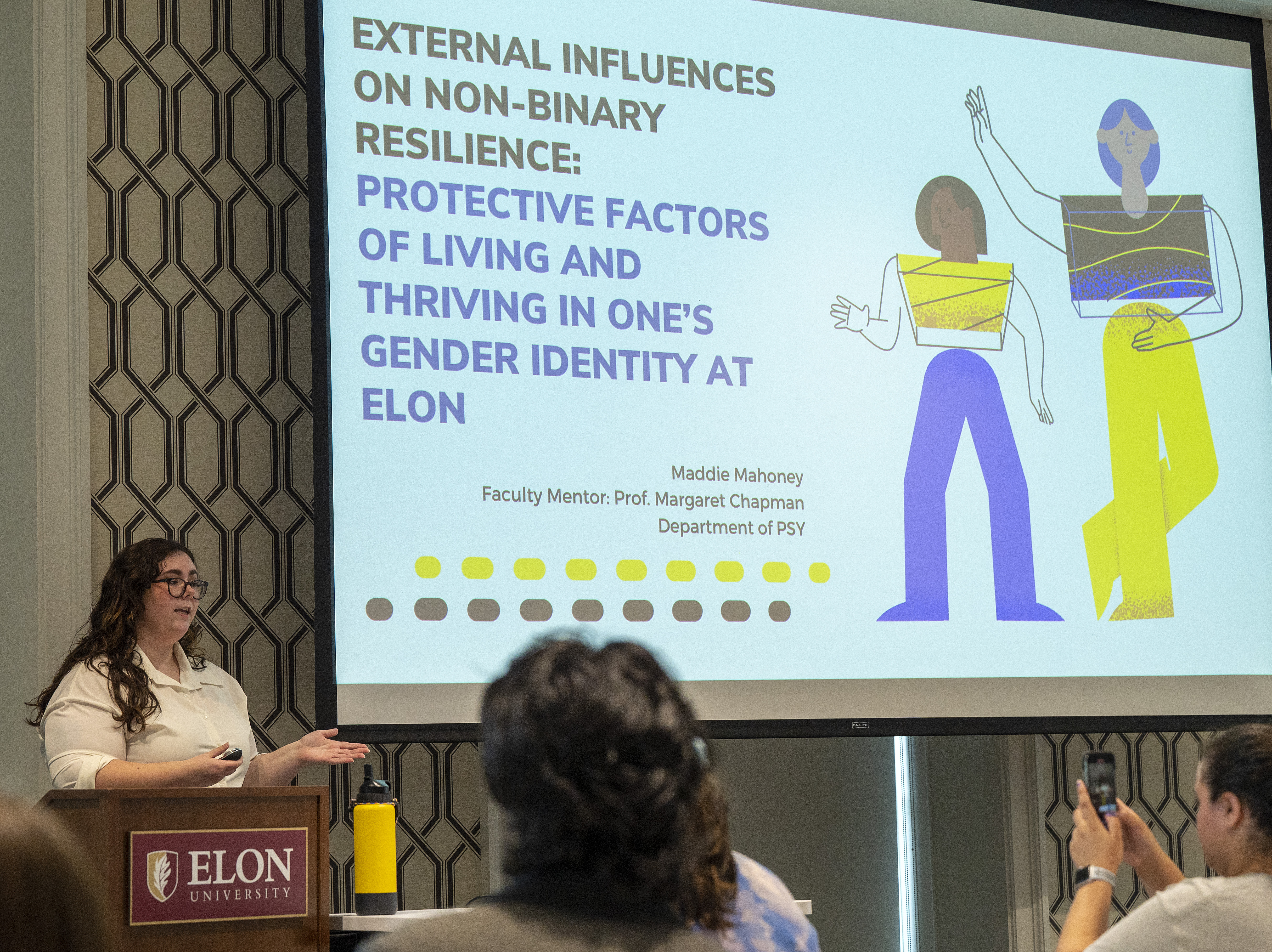
Gerth explained that the success of that video and the increasing reliance by candidates upon digital media relayed through sites such as YouTube and social media signals a new trend. “We have essentially shifted into this new school in which we don’t need television as much and you can rely on YouTube, which can be shared and commented on,” Gerth explained in her presentation.
Gerth’s examination of the 26 candidate announcement videos explored ways the candidates framed themselves and their candidacy, with Gerth looking at how they drew upon their own biographies, partisanship and gender themes. She had hoped her research would show a correlation between the use of an effective announcement video and success at the polls, but found that connection wasn’t apparent, in part because of the complex range of factors that contribute to success on Election Day. She did find a correlation between an announcement video and success in fundraising during the quarter after the video was released.
For Gerth, Tuesday’s presentation was something tangible that speaks to the range of experience she’s gained through undergraduate research, an experience she plans to build upon as she pursues her master’s degree at the London School of Economics following graduation later this month.
“I’ve gained that rich experience of working with a mentor that has helped my confidence grow as a student,” Gerth said.



